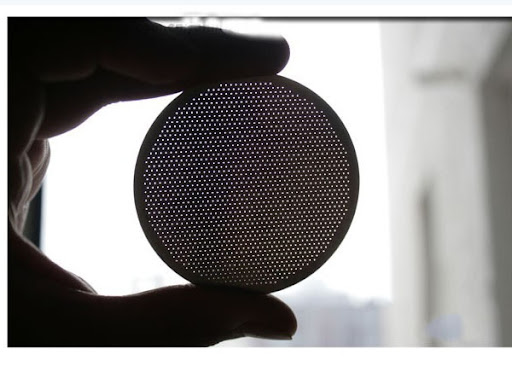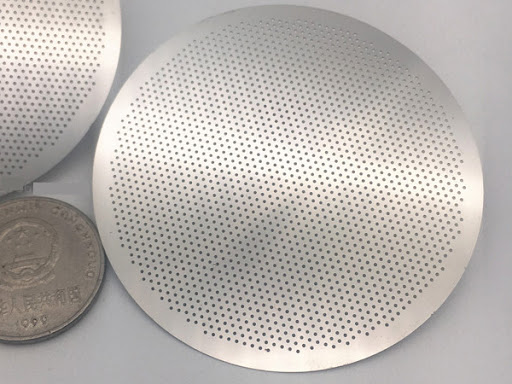Note that there is photo etched coffee filter disc with a built-in pressure reducer. It stabilizes the water pressure and protects the device from water hammer, significantly increasing its resource. On average, coffee filters can be considered a budget solution compared to mesh options. But they require more careful attention and periodic maintenance.

In some cases, treating water from natural sources, disc and strainers may not help, for example, when the water carries with it pieces of clay or similar viscous materials.
Moreover, they very quickly clog the screens and grooves of the discs, which make the operation of such filters extremely ineffective. In this case, a photo etched coffee filter disc will be the best solution for drinking or technical needs.
The material of the filter element "bag" withstands a wide range of temperatures, does not interact with chemical impurities and, depending on the size of the cell, retains particles from 1 to 100 microns.
The advantage of the coffee filter is its high performance due to its large filtering surface. Important factors include the low price of replacement elements, and the ability to extend the service life with regular service. The main disadvantage of coffee filters is the same as for other coarse filters. They retain only mechanical impurities and do not interact in any way with dissolved salts.
s
Furthermore, photo etched coffee filter disc can cope with the task of removing fine suspended matter, gases, hardness, organic pollutants and much more. The device of etched coffee filters implies the presence of a specialized cartridge in the body. The cartridge is selected for a specific type of pollution, such as:
Specificity of cartridges
Photo etched coffee filter disc cartridges are of many types:
When choosing an etched coffee filter, you should pay attention to its performance. Water demand can vary significantly for domestic and commercial needs. Similarly, it depends on the number of household members and other requirements.
Cartridge bodies are of different sizes, and they also determine the format of the cartridge that is built into them. The world standard for flasks and cartridges is SL and BB. Of these, the most common sizes for home and cottage coffee treatment are 10SL, 10BB and 20BB.
Where the numbers indicate the height of the filter housing in inches, and the letters indicate its width. Like coarse filters, photo etched coffee filter disc differ in those that work with hot water, and those that work with cold water.
The external difference is similar to coarse filters. In order to avoid unexpected flooding, it is worth knowing the temperature regime in which the flask operates.
Flasks of different formats are placed depending on the amount of free space and performance requirements. If there is little water consumption or a small amount of space, it is wise to install a 10SL - 10BB flask. Therefore, this option is often used in apartments.
If you need to process a much larger volume, then 20BB flasks will come to the rescue. Their design assumes a large capacity and the use of cartridges with a larger filtration area. This format, due to its size, is mainly used for country houses as photo etched coffee filter disc is used.
There are specific sizes, but they are mainly used in;
The main characteristics of the enclosures are mounting dimensions and performance. The care of water quality lies with the cartridge.
When solving a complex problem of coffee treatment, cartridge filters are combined into a system designed for optimal water purification. In addition, there are often cases when rough and fine cleaning is required.
It should be added that some manufacturers deviate from standard sizes in their products. It is worth paying attention to this when buying, since replacements from other manufacturers will not fit their cases.
A disposable paper filter is convenient, but there are other options for getting an excellent drink with minimal impact on the environment.
Made from untreated organic cotton or hemp fibers and does not affect the taste or aroma of coffee in any way. The only drawback is that the fabric filter must be thoroughly rinsed from any thicknesses after each brew to remove all oils.
Funnel made of soft synthetic fabric - nylon on a plastic frame: an economical and practical option. It is believed to allow more oils to pass through than the filter paper, so a different option should be chosen for dark roasted or too finely ground beans.

Fine cone-shaped mesh made of titanium or gold-plated steel. It is convenient with such a filter: you do not need to think about disposable supplies and fiddle with rinsing them before starting brewing. After use, it is enough to rinse in clean water or put in the dishwasher.
Steel is an absolutely inert durable material and does not in any way affect the taste and aroma of coffee. These photo etched coffee filter disc models are usually versatile and will fit most drip coffee makers and funnels.
In a situation where you find yourself in the morning without a filter or want to make filter coffee in a hiking environment, you can do with the available means:
Table napkins, two or three layers: Spread them neatly along the sides of the funnel so that they do not crease or move when water is spilled.
Folded paper towel
Gauze or bandage: fold several times and rinse well to get rid of the pharmacy odor
Cotton fabric: Cut out a square, fold it 4 times and place in the funnel. Moisten and spread over the sides of the funnel before adding coffee.
Pay attention to the thickness of the photo etched coffee filter disc:
This is good when it comes to us, but can be frustrating when brewing in a drip coffee maker. There are several standard sizes of conical filters, each indicating how many cups you can brew with it depending on the brewing method.